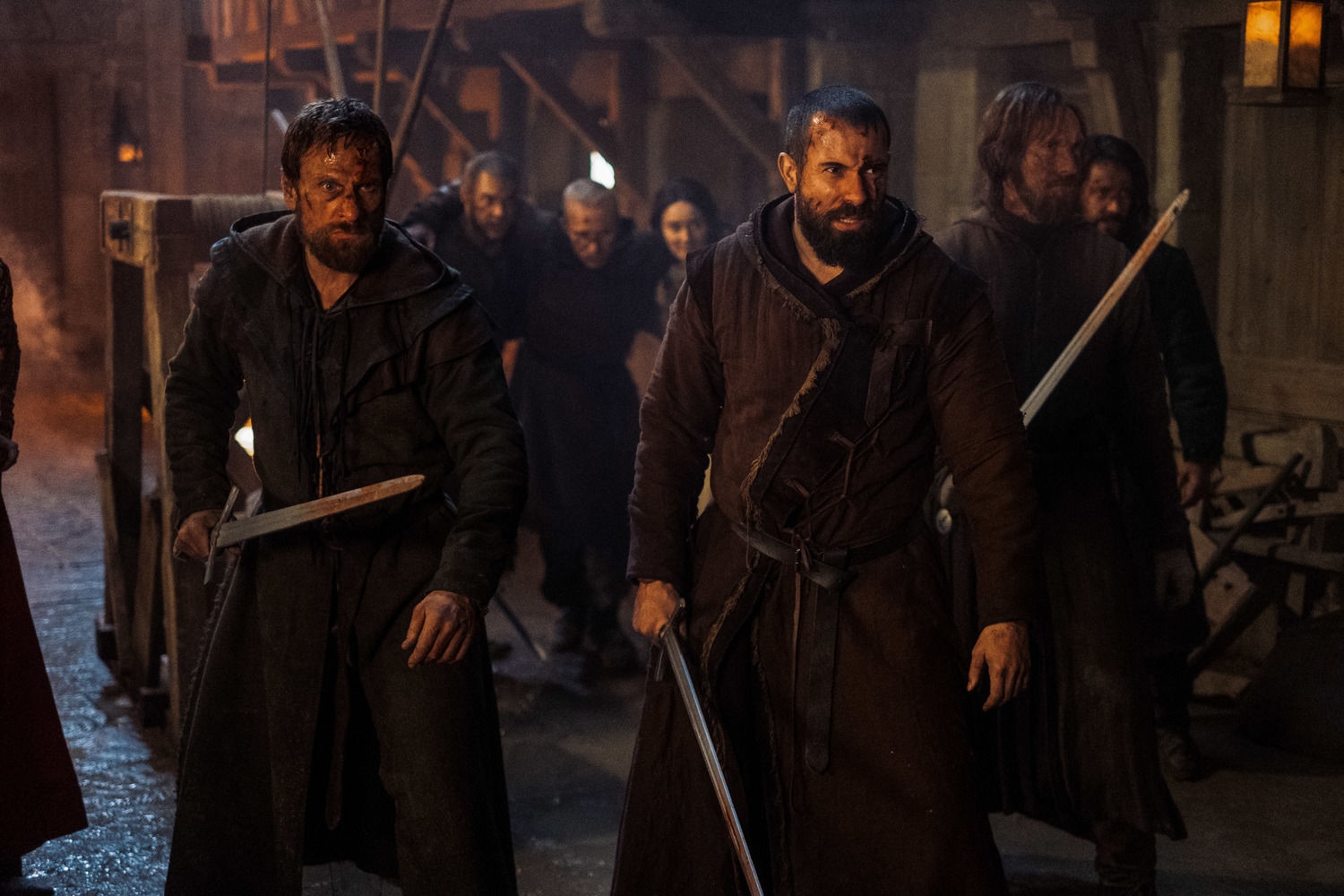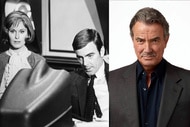Create a free profile to get unlimited access to exclusive videos, sweepstakes, and more!
Tom Cullen talks fate of Knightfall and Landry after Season 2 finale

**SPOILER WARNING: Spoilers below for Knightfall's "While I Breathe, I Trust the Cross" episode below!**
After a bleak start to the Knightfall Season 2 finale, “While I Breathe, I Trust the Cross,” Landry (Tom Cullen) and his surviving Templar brothers escaped from the flames to fight their way through Paris, literally and figuratively.
It was a season of remorse, piety, and penitence for Landry as he was forced to humble himself before God and the Templar Master, Talus (Mark Hamill). In that journey, he found purpose again in helping train the new brothers of the Templar, keeping his daughter alive, and ultimately facing King Phillip (Ed Stoppard) in an epic showdown in the last moments of the finale.
SYFY WIRE spoke to lead actor Tom Cullen on the phone to discuss some key moments in tonight's Knightfall finale and what a third season might look like if HISTORY picks it up.
Let’s start with Gawain (Pádraic Delaney) and Landry finally having their much-anticipated confrontation as they hide from the King’s guards. First it’s words, but then it devolves into this broken fistfight that speaks volumes.
Tom Cullen: [Showrunner] Aaron [Helbing], Pádraic, and I really worked on that scene, getting it into a shape that we all felt happy with. Aaron's a really fantastic collaborator like that, and he really heard us and allowed us to navigate what we wanted to put in there. What I love about that scene is that it has absolutely zero subtext, it's kind of Shakespearean in a way, with people literally just saying what they feel. It is great to see these two characters, who feel vindicated and justified in their actions.
Also, because they spent an entire season apart from each other, they kind of go at each other expecting that person to be the same person. But what comes back at them is a different person, because during the second season they've both changed immeasurably. I think that that's quite surprising for both of them, and they don't quite know how to handle it. They're both right, and they're both wrong, at the same time.
They both have very persuasive arguments from their points of view.
It's a very complex dynamic, and it is a very complex scene. I think that Gawain still harbors this resentment of Landry, which dates back 15 years, when he took a shot for him and has unfairly blamed Landry for that, even though it was Gawain's own actions. I feel like there's a lot of frustration there, and for Gawain, Landry has become this point of reference for his own failings. Gawain, rather than really looking at himself, is blaming Landry, and there's this interesting moment where, through Landry's redemption, Landry says that he recognizes his faults and he's not defensive. There's this moment where I feel like Gawain really realizes that maybe he needs to do the same and he needs to search for his own redemption.
Was that always in the script where you guys would have that really broken tussle at the end? It added this wonderful little button to their confrontation.
I really loved that button as well, because they kind of shout at each other and then the army sweeps past, and they have to hide and "shut up." Then they just sat there together, and within this posturing and them fighting with each other, they actually realize that they both have nothing. Everything that they have spent their lives working towards has been destroyed by both of them. There's an interesting, weird bonding moment there, which I think is really powerful.
This is a very dark show, so the scene where Landry goes up to the roof at dawn and signals the other surviving Templars felt like a rare moment of real hope for them. Did you all play it as almost "God’s wind under their sails" once more?
That's so interesting that you felt like that. I love going on top of roofs anyway. Going up and looking over a city is quite an amazing feeling. You feel separate from it, and somehow there is a sense of enlightenment. When I look over a city, there is calmness, of seeing all of these lives below you. Through the denseness of these houses and these people and the city, these three people see each other with such clarity. I think that it is a really moving moment, and it's an enlightening moment. As you say, it is a really emboldening moment for them, where they know that each other is okay, and I think that's what brotherhood is about. Ultimately, it is about a very deep love for each other and the friendships that they have.
Let’s talk about the ending, which is a goosebump moment as Landry shows up to confront King Phillip, leaving his brothers behind on that boat. Was it always going to play out the way it does?
We went back and forth with lots of different ideas about how we should resolve it. I think the audience knows, and we all felt that the season would be heading to some kind of ultimatum between Landry and Philip. I feel like the brilliant foreshadowing of that dream in Episode 1 where Philip kills Landry, it's very much a top and tail of the season.
We talked a lot about how it should be done. We absolutely felt like Louis [Tom Forbes] should be there, and the complexity of that, and the betrayal that everyone feels in those moments. You kind of throw all this stuff out, and then Aaron wrote this theme that is so minimal and so clean and so powerful. Then it comes down to shooting, and because of scheduling we had very little time to shoot it, so you just do it and move through it. There is very little time to ruminate on it. I think it's really powerful, and I hope that the audience feel some kind of conclusion, one way or another. It might not be the conclusion that they want. It might not be what they're searching for, but it certainly feels like that chapter might be closed. I don't know, because it still feels very open to me, but I think that audiences will feel some form of satisfaction.
That moment when the camera just captures your face after he has the killing blow, and he looks up. In embodying what Landry's feeling, what did you want to come across?
Actually, the scene was supposed to end when I killed him and said the line, but the director just kept the cameras rolling, so I just carried on "being in it." I remember just feeling this huge sense of relief, as though something had moved forward and something had lifted from him. It felt like it was going up in the air. The look is very much "up to" God. The relief feeling that his daughter is definitely safe, but that he avenged Joan's death righteously.
The order for a third year hasn't been announced. And that last scene could be a very powerful end. But then Landry’s still in Paris, the Templars are in shreds and Isabella is going to be a queen, and she's maybe more horrible than her father. Have there been conversations about where you feel the next chapter would go?
I know that Aaron has been wondering where we can go. The great thing about the history of the Templars is that there's a really fascinating moment where history ends and mythology begins after the Templars were dissolved. The Templars actually weren't dissolved in England or in Spain or in other areas for another 10 years after that, because Longshanks couldn't believe that the Templars could have done what Philip was blaming them for. He really felt like Philip was just in debt and wanted the Templars' money.
There are stories about the Templars going to Scotland and helping in the war between the Scottish and the English, and bringing Robert the Bruce to the floor. Lots of them went and started pirating. Some of them went to Malta and essentially formed the Knights of Malta, who are still kind of there. I was filming in Malta last year and it was kind of spooky to be there. There are lots more stories to tell; whether we feel like that is the right thing to do is another question. I think that the audience will feel a level of satisfaction, but there is still, as you said, a lot of open story lines. The big one for me is Pope Clement, who has really risen. I think that the Templars will really want to exact some kind of revenge on him, because I think they feel strongly betrayed by his actions.














